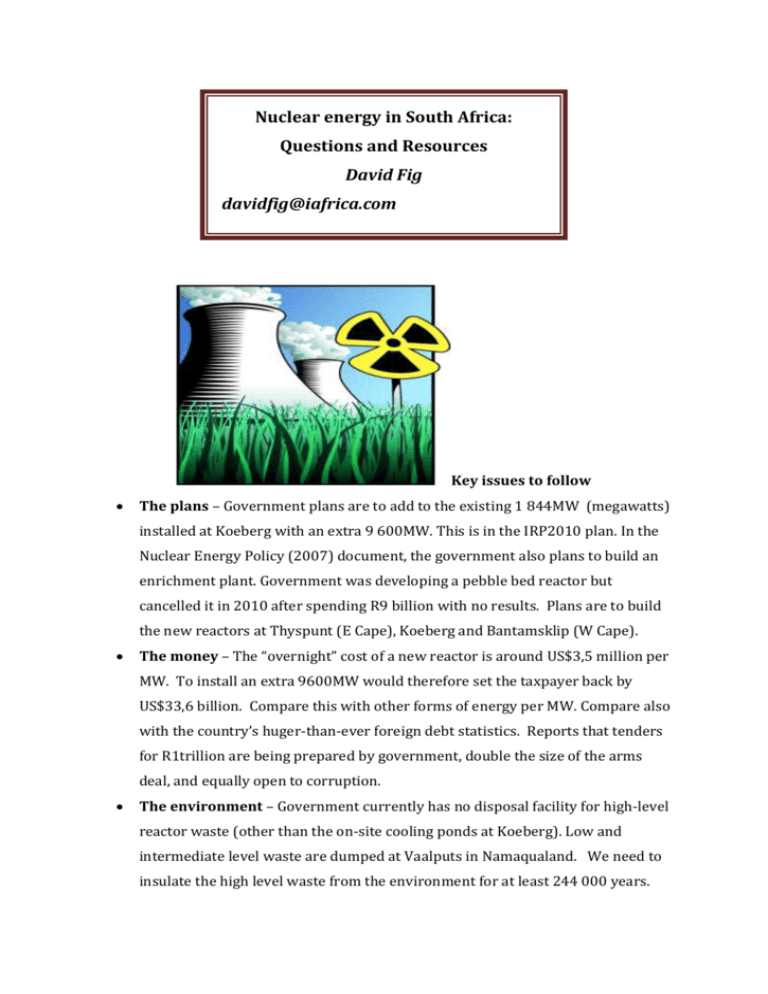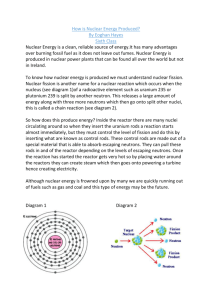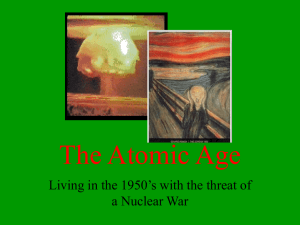DAVID FIG Power reporting Nuclear Key Issues
advertisement

Nuclear energy in South Africa: Questions and Resources David Fig davidfig@iafrica.com Key issues to follow The plans – Government plans are to add to the existing 1 844MW (megawatts) installed at Koeberg with an extra 9 600MW. This is in the IRP2010 plan. In the Nuclear Energy Policy (2007) document, the government also plans to build an enrichment plant. Government was developing a pebble bed reactor but cancelled it in 2010 after spending R9 billion with no results. Plans are to build the new reactors at Thyspunt (E Cape), Koeberg and Bantamsklip (W Cape). The money – The “overnight” cost of a new reactor is around US$3,5 million per MW. To install an extra 9600MW would therefore set the taxpayer back by US$33,6 billion. Compare this with other forms of energy per MW. Compare also with the country’s huger-than-ever foreign debt statistics. Reports that tenders for R1trillion are being prepared by government, double the size of the arms deal, and equally open to corruption. The environment – Government currently has no disposal facility for high-level reactor waste (other than the on-site cooling ponds at Koeberg). Low and intermediate level waste are dumped at Vaalputs in Namaqualand. We need to insulate the high level waste from the environment for at least 244 000 years. Worker health – a large number of workers at NECSA (Pelindaba) are trying to claim compensation for health impacts of working in the industry. Up to now their applications have been in vain. NECSA claimed not to have kept efficient health records of its workers. Jobs - there will be some jobs but local citizens lack the skills to work in the reactors, causing most of the new jobs to go to imported workers. Compare this with the many more local jobs (without needing a physics degree) opened up by renewable energy sources at local level in many parts of the country. Regulation – the National Nuclear Regulator has admitted that it is undercapacitated and under-funded. If we are to multiply nuclear facilities that require regulation, our current establishment will not cope, when more scrupulous regulation is needed more than ever. Safety - in the wake of the Fukushima disaster, it became clear that the operating company did very little to prevent explosions and meltdowns. They also covered up some aspects of their mismanagement. Are our authorities more technically competent? Are our rural municipalities geared up to protect communities from radioactive spillages? Is our emergency planning effective? Climate – although it is true that there are few carbon emissions from a reactor, many of the other processes in the nuclear fuel chain emit huge amounts of carbon. These include mining uranium, enrichment, fuel fabrication, transport of nuclear materials, reactor construction and decommission at the end of its life. Giving up nuclear - Germany and Switzerland are winding down their nuclear programmes. Italians have voted in a referendum against nuclear. Austria will not go nuclear. Russia and China are making safety reviews of their nuclear industry after Fukushima. Is there something to learn from these actions? The nuclear lobby – who supports nuclear? In South Africa there is pressure from fleet builders Areva (France), Westinghouse (US-Japan), and GEC-Hitachi (US-Japan). South Korea and China also want us to purchase their reactors, which are less advanced and have less safety features. In SA, the mining, smelting and some manufacturing industries (forming the Energy Intensive User Group) also have a pronuclear stance and are putting pressure on government to go down this path. Alternatives – government and intensive users of electricity argue that they need “baseline” electricity (that is constantly provided and not intermittent). They don’t accept that renewables can deliver this. This is contrary to all experience in countries that have taken renewables seriously. If there are enough renewables, there will be no intermittence, as different modes (sun, wind, tides, biogas) will complement one another. We are a sunny, windy country. We don’t have to be prisoners of fossil fuels and uranium. Resources: Telephonic Coalition Against Nuclear Energy --- 072 6285131 Koeberg Alert Alliance - 083 4442083 Pelindaba Working Group – 083 7404676 Earthlife Africa Johannesburg – 082 6829177 Earthlife Africa Cape Town – 083 4717276 Greenpeace Africa – 011 482 4696 Federation for a Sustainable Environment – 073 2314893 SA Faith Communities’ Environmental Institute – 082 7315643 National Union of Mineworkers – 011 8337012 Eskom spokesperson – 082 4436683 National Nuclear Regulator – 012 6747100 NECSA- 012 3054911 Department of Energy – 012 4444253/4190 Printed/online The following publications also contain resource lists or useful references: David Fig, 2007. Uranium road: questioning South Africa’s nuclear direction. Johannesburg: Jacana (an earlier version appears on the Heinrich Boell Stiftung Southern Africa website) www.boell.org.za David Fig, 2010. Nuclear energy rethink?: the rise and demise of South Africa’s Pebble Bed Modular Reactor. ISS Paper 210. Pretoria: Institute of Security Studies. www.issafrica.org Greenpeace International, 2011. The true cost of nuclear power in South Africa. Amsterdam: Greenpeace International. www.greenpeace.org/africa Other publications Engineering News www.engineeringnews.co.za Nuclear Monitor www.antenna.nl/wise Nucleonics Week www,platts.com/Products/nucleonicsweek Nuclear Intelligence Weekly www.energyintel.com






